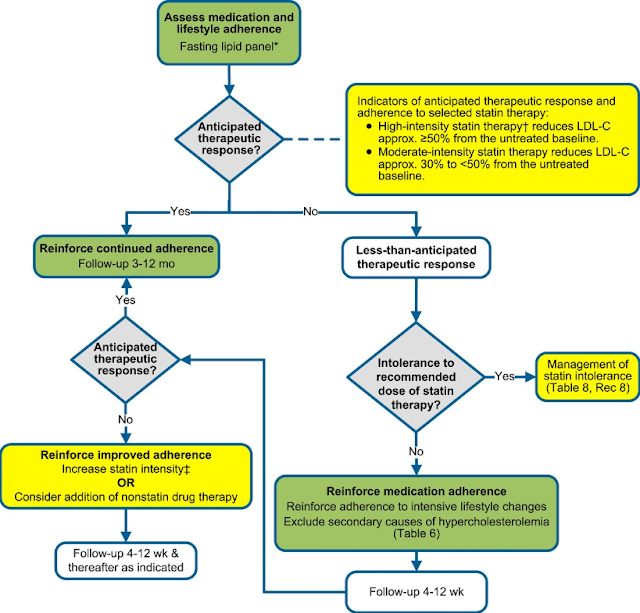Acc Aha Guidelines Cholesterol - New ACC/AHA Cholesterol Guideline Allows For More Personalized Care; New Treatment Options
The different 2018 ACC/AHA church doctrine on the management of Blood sterol makes it potential for for further customized take care of sufferers compared to its 2013 precursor. among the various greatest adjustments: further precise likelihood assessments and new cholesterol-decreasing drug alternate choices for individuals at the utmost risk for heart issues. The directions had been launched Nov. ten at AHA 2018 in Chicago, IL, and at the same time denote within the Journal of the yankee faculty of medicine and Circulation.
"Excessive ldl cholesterol remedy is not one size fits all, and this guiding principle strongly establishes the importance of personalised care," said ACC President C. Michael Valentine, MD, FACC. "over the last five years, we now have realized even more about new remedy alternatives and which patients can also advantage from them. by means of featuring a treatment roadmap for clinicians, we are giving them the tools to assist their patients be aware and manipulate their chance and are living longer, more healthy lives."
Besides traditional chance components such as smoking, high blood drive and excessive blood sugar, the new tenet adds components like household heritage and ethnicity, in addition to definite health situations equivalent to metabolic syndrome, continual kidney sickness, continual inflammatory circumstances, untimely menopause or pre-eclampsia and high lipid biomarkers, to aid fitness care suppliers more advantageous examine individualized chance and treatment options. They additionally recommend coronary artery calcium rankings as a second-line decision-making tool with sufferers when settling on no matter if to use statins.
Recognizing the cumulative impact of excessive ldl cholesterol over the whole lifespan, selecting and treating it early can help reduce the lifetime possibility for heart problems. the new tenet suggests elective ldl cholesterol screening is applicable for babies as younger as two who've a family unit background of coronary heart sickness or excessive cholesterol. In most toddlers, an initial screening test may also be regarded between the a long time of 9 and eleven and then once again between 17 and 21. as a result of a scarcity of enough proof in younger adults, there aren't any particular innovations for that age neighborhood. although, it is simple that they adhere to a match culture, be aware about the risk of high levels of cholesterol and get medicine as appropriate in any respect a long time to cut back the lifetime possibility of coronary heart sickness and stroke.
"Having excessive cholesterol at any age increases that risk tremendously. it truly is why it's so critical that even at a young age, people observe a coronary heart-heathy tradition and be aware and maintain healthy cholesterol levels," observed AHA President Ivor Benjamin, MD, FACC.
The tenet also units out very particular suggestions for clinicians to focus on options with sufferers in the newly defined "very excessive chance of ASCVD" class who nevertheless have LDL-C above 70 mg/dL after maximizing statin remedy. It recommends on the grounds that other non-statin medication, together with ezetimibe and PCSK9 inhibitors. For the primary time, the new guiding principle additionally comprises a value statement that underscores the need for clinicians and patients to aspect within the charge of medication in selecting the most appropriate treatment costs. The guideline offers PCSK9 inhibitors a not pricey value for patients at very excessive risk of ASCVD and unsure price for patients with familial hypercholesterolemia compared to respectable charge price in response to pricing via mid-2018. besides the fact that children, it is still to be viewed if recent savings in pricing for some PCSK9 inhibitors and consequences from clinical consequences effects from stories like ODYSSEY results could alter the value equation down the road.
"The ACC has long recognized that the charge of PCSK9s have made affected person access a controversy. we are committed to assisting physicians with access to care considerations, whereas also bringing together stakeholders, together with payer, trade and clinician representatives, to talk about alternatives to stream forward together," Valentine adds. "Our intention is to make sure the optimum risk patients have access to the care they need."
The ACC has developed both clinician and affected person equipment to support understand the new guideline and enforce innovations on the factor of care. These tools, together with cellular apps, infographics, key views, a evaluation chart and "tenet Made simple" device, can be found on the cholesterol tenet Hub on ACC.org.



EmoticonEmoticon